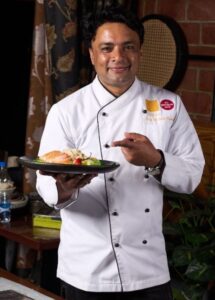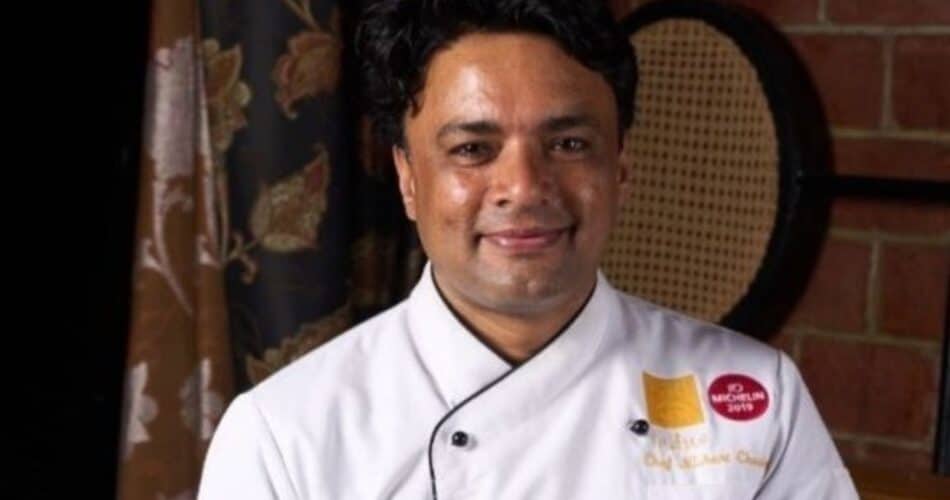From a village named Kasmar in Jharkhand’s Bokaro district, Nishant Choubey has gone places and moved up many notches in life, but he has not lost his connect with his roots.
After a career that saw him launch his career at The Oberoi Rajvilas, which within the hotel chain is known as “Vikram Oberoi’s baby” (as Nishant informed us on ‘Food Talk with Sourish Bhattacharyya’), moving on to the UAE to hone his skills at the Madinat Jumeirah beach resort under Chef Sameer Miglani, returning home to make a mark at Olive Beach and then Cibo – two of Delhi’s ground-breaking restaurants in the early 2000s, and finally spending a fruitful decade at The Roseate hotels, Nishant today is a celebrity chef, well-regarded culinary consultant, and the flag bearer of Bhaanas, the first restaurant in the national capital to serve food from the four eastern states of Bihar, Jharkhand, Odisha and West Bengal.
More than anything else, he values most his new role as the unofficial ambassador of the food of Jharkhand, the food he grew up with, which he re-connected with during a recent visit with some leading chefs to his home state organised by IHM-Ranchi. Nishant has rolled out eateries in Bangkok, New Jersey, Tokyo and Vancouver, and he shepherded the launch of the avant-garde Indian restaurant Kheer at the Roseate House in New Delhi Aerocity, but his heart now beats the loudest for Bhaanas, which, incidentally, means ‘food’ in the Maithili dialect spoken in parts of Bihar.
Nishant’s food journey has seen him trying his hand (without burning it!) in vastly different cuisines – from Italian at the Madinat Jumeriah to Spanish at Olive Beach and Louisiana Creole at Cibo, to Pan-Asian at the Dusit Devarana in New Delhi, and, just last year, to South African – but he now believes it is time for him to immerse himself into the vibrant and varied world of Purvanchal’s cuisines. Back in Madinat Jumeirah, this would have seemed unimaginable to Nishant, for he then believed “Indian mein kuchh mazaa nahin hai (there’s no fun in cooking Indian).”

Nishant was visiting the We The Chefs Experiential Centre at Gurugram, Haryana, when he sat down for a conversation on ‘Food Talk’, looking back at his busy life and reflecting on the contributions of home chefs to adding a new dimension to the food and beverage business in the country.
Picking up the threads of his story from the time he returned home after a stint at the Madinat Jumeirah, Nishant remembered how he was hired for Olive by Chef Sabyasachi ‘Saby’ Gorai and the four years he spent with the group saw him in the kitchens of Olive Beach, which had a Mediterranean menu, then at the nightclub LAP, which was once Delhi’s most happening watering hole right across the road from the Prime Minister’s Residence, and finally, Ai, the Japanese restaurant that opened at a mall but now runs as Guppy by Ai at the swish Lodi Colony market.
From Olive he moved to one of the best-looking restaurants that Delhi has ever seen – fashion designer Rohit Bal’s Cibo literally in the backyard of the ITDC-run Hotel Janpath, which, sadly, was too ambitious in scale and too ahead of its time.
Nishant went on to spend quality time at The Roseate hotels, the passion project of the late Ankur Bhatia, but his culinary skills were put to test with the Japan-based Indian entrepreneur S.J.B. Singh Sandhar’s Seinan Group, and he cleared it with top grades. He started with setting up an Indian restaurant named Clove in Vancouver and finally opened a Haldiram’s-style tuck shop with no seating in Tokyo. It is called the Tokyo Mithai Wala and it sells everything – from gol gappas to aloo puri to veg chowmein.
“It was an experiment to begin with, but the response took up by surprise,” Nishant said. “Today, our ‘macha rasmalai’ is the most popular and we now have two Mithai Walas, one in Tokyo and the other in Canada. We even have a little bit of seating.” Buoyed by the success of these projects, and the Indian restaurant he helped set up in Hamilton, New Jersey (USA), some 45 minutes away from New York City, Nishant has signed up projects in Houston (Texas) and California. And in between all this action, he teamed up with the veteran food scholar and chronicler, Pushpesh Pant, to open Indus, a Michelin Guide restaurant in Bangkok.
Nishant may be a jet-setting international restaurant consultant, but he has been a big supporter of We The Chefs all along because he believes that home chefs are responsible for maintaining the purity of Indian food, even as we, as a nation, open up to culinary influences from around the world.
“If the culture of takeaway food is still alive post-Covid, we have to thank home chefs for it,” Nishant said. “They have been able to do it because they are passionate about purity and stay away from gimmicks such as cooking Maggi noodles with ‘gulab jamun’! They know what they are doing. They make classical food and make no compromises on purity.”
The challenge for home chefs, though, is how to scale up and compete with industrial-scale kitchens. Nishant suggested that to address the problem, the industry needs to develop training modules for home chefs so that they are not found wanting when they have to scale up and manage delivery issues. “We must have a system that will enable home chefs to access modules and trainers,” Nishant added.
He concluded by saying it is important for hotel and restaurant chefs to work together with home chefs and partake of the wealth of knowledge about regional cuisines they are custodians of. If the Covid lockdowns achieved anything positive, it was to bring the kitchens of home chefs into the national mainstream and because of their passion and hard work, make regional Indian cuisines fashionable all over again.

